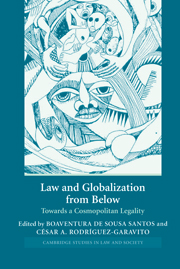Book contents
- Frontmatter
- Contents
- Notes on the contributors
- 1 Law, politics, and the subaltern in counter-hegemonic globalization
- PART ONE LAW AND THE CONSTRUCTION OF A GLOBAL ECONOMY OF SOLIDARITY
- PART TWO TRANSNATIONAL SOCIAL MOVEMENTS AND THE RECONSTRUCTION OF HUMAN RIGHTS
- PART THREE LAW AND PARTICIPATORY DEMOCRACY: BETWEEN THE LOCAL AND THE GLOBAL
- 12 Political and legal struggles over resources and democracy: experiences with gender budgeting in Tanzania
- 13 Two democracies, two legalities: participatory budgeting in Porto Alegre, Brazil
- 14 Life, life world, and life chances: vulnerability and survival in Indian constitutional law
- 15 Bottom-up environmental law and democracy in the risk society: Portuguese experiences in the European context
- Index
- References
14 - Life, life world, and life chances: vulnerability and survival in Indian constitutional law
Published online by Cambridge University Press: 07 July 2009
- Frontmatter
- Contents
- Notes on the contributors
- 1 Law, politics, and the subaltern in counter-hegemonic globalization
- PART ONE LAW AND THE CONSTRUCTION OF A GLOBAL ECONOMY OF SOLIDARITY
- PART TWO TRANSNATIONAL SOCIAL MOVEMENTS AND THE RECONSTRUCTION OF HUMAN RIGHTS
- PART THREE LAW AND PARTICIPATORY DEMOCRACY: BETWEEN THE LOCAL AND THE GLOBAL
- 12 Political and legal struggles over resources and democracy: experiences with gender budgeting in Tanzania
- 13 Two democracies, two legalities: participatory budgeting in Porto Alegre, Brazil
- 14 Life, life world, and life chances: vulnerability and survival in Indian constitutional law
- 15 Bottom-up environmental law and democracy in the risk society: Portuguese experiences in the European context
- Index
- References
Summary
INTRODUCTION
This chapter is a series of observations on a thought experiment. It is written by two authors, neither of whom is an authority on law but both of whom recognize that law is a kind of environment, a second skin in which many of us swim. As one wag put it, “when you don't like law, one calls it bureaucracy but when one admires and judges it as creative or exotic, it becomes jurisprudence.”
The constitution of India falls under the second category. Popular films like Dev, Garv, and Khakee, endow it with an almost canonical status. However, during the last few years, the National Democratic Alliance (NDA), the coalition party which was in power until May 2004, was keen to institute a review of the constitution. There was a sense that the constitution, despite a coral reef of amendments, was anachronistic. But the debate over the review was seen in parochial terms and not much came of it.
The authors were requested to write a monograph on the Directive Principles of State Policy (DPSP). India is one of the three countries, along with Ireland and Russia, whose constitutions have a chapter on DPSP. Part IV of the Indian constitution (Articles 36–51) contains the DPSP. As rights, these are not enforceable, yet they constitute part of the frame within which rights are articulated. The DPSP add a vision of economic democracy to the idea of fundamental rights.
- Type
- Chapter
- Information
- Law and Globalization from BelowTowards a Cosmopolitan Legality, pp. 339 - 362Publisher: Cambridge University PressPrint publication year: 2005



